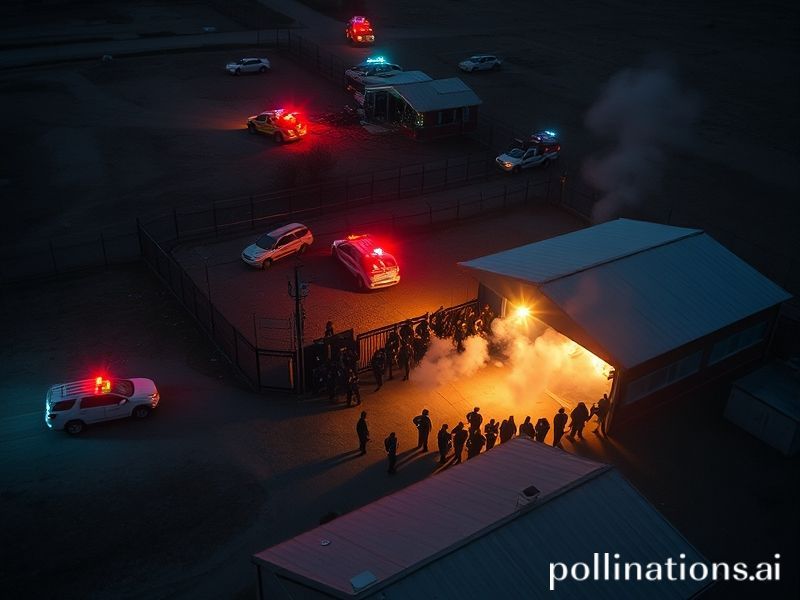Texas ICE Facility Blaze: The World Watches America’s Border Breakout Like Reality TV with Higher Stakes
SAN MIGUELITO, Texas—Somewhere between the breakfast-taco stands and the border fence that looks like a rejected set piece from a low-budget dystopia, a modest Immigration and Customs Enforcement holding facility had what the official communiqués will call “an incident” and what anyone with a working smartphone will call “Tuesday.” The attack—reportedly a coordinated effort involving drones, power tools, and at least one enterprising soul who Googled “how to cut rebar quietly”—left the facility scorched, the staff rattled, and the global commentariat positively delighted to have something new to scream about.
To the rest of the planet, the episode is less a local crime blotter item and more a Rorschach test on the state of Western asylum policy. In Berlin, the morning papers framed it as “America’s Carthage moment”; in Ankara, the foreign ministry issued a statement reminding everyone that Turkey has hosted 3.6 million refugees without once needing a viral TikTok to spark a prison break. Meanwhile, Qatari television—never missing the chance for premium schadenfreude—ran a chyron labeling Texas “the world’s newest failed state, sponsored by oil and poor impulse control.”
The geopolitical tea leaves are easier to read than a MAGA hat at a vegan co-op: every border crisis is now a live-streamed spectator sport, complete with merch drops. Within six hours, #TexasBreakout trended above #Ukraine and just below #EurovisionGoneWrong, proving that attention spans have the half-life of cheap tequila. European officials, still nursing bruises from last summer’s Mediterranean photo-ops, watched the footage with the guilty relief of a teenager whose house party was just outdone by the neighbor’s. “At least our riots have architectural restraint,” one Greek minister sniffed, before returning to a budget meeting on concrete sea barriers that even Poseidon would deem tacky.
The real international subplot is the arms race of empathy. Canada—ever eager to monetize moral superiority—announced it would fast-track visas for any detainee who could prove they once retweeted Justin Trudeau. Denmark, in a masterstroke of Nordic passive aggression, offered to send Lego therapy kits to traumatized guards. And China, never wasting a teachable moment, cited the episode as evidence that “chaos is the inevitable fruit of bourgeois democracy,” conveniently omitting its own record on unauthorized architectural exits.
For multinational security contractors, the attack is Black Friday come early. Shares in drone-detection startups leapt faster than you can say “non-lethal countermeasure,” while European conglomerates dusted off brochures for electrified fencing that doubles as a Wi-Fi hotspot—because nothing says humane deterrence like scrolling Instagram through mild electrocution. Analysts at Lloyd’s of London have already priced in a 12 percent hike in “civil unrest” premiums across the southern United States, right next to the actuarial table for “hurricane meets conspiracy theory.”
Economists with a sense of irony note that every burned cot in Texas equals one new job in the global border-industrial complex. From Jordanian refugee camps patrolled by EU-funded drones to Australian offshore “processing centers” that resemble Bond-villain lairs designed on a budget, the world is converging on a single business model: paywall the planet and charge admission to the fire escape. In that context, last night’s amateur arson looks less like an assault on law and order and more like an unpaid invoice in the ledger of outsourced sovereignty.
As dawn breaks and the Texas Rangers (the lawmen, not the baseball team—confusing, I know) pick through the ashes, the takeaway for the international reader is elegantly simple: borders are now content, migrants are collateral engagement, and every explosion—literal or metaphorical—generates its own streaming spin-off. Somewhere in the Hague, a war-crimes prosecutor just updated his LinkedIn headline to “Seasoned in Transnational Schadenfreude.” And somewhere else—perhaps a WhatsApp group labeled “Next Moves”—another plan is being drafted, because nothing on this flat, overheated earth spreads faster than the idea that someone else’s wall is your on-ramp to a better life.







